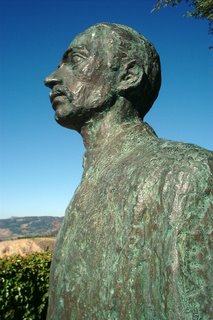Stuff happens?
The Work and its author by Roger Shattuck. It came from somewhere, but I can't find the link. Got half-way through the other day, but wanting to concentrate, left it. Now, looking for it, came across Denis Dutton's, The Pleasure of Fiction, a long review of Joseph Caroll's Literary Darwinism, which had previously read, but couldn't remember details of! Although knowing the Proust piece was important (but so ignorant as never to have heard of Shattuck), once back on evolutionary psychology & lit., knew I had to read it through first. Maybe my questions about reading and writing might be answered without me having to make the effort to think too much about it.
Plenty of readers would no doubt say they would prefer to read the novels than spend their valuable time reading about them. I don't fall into that cateogry. My inchoate thoughts on this run along the lines of "When it comes down to it each person has a different way of tackling and using literature".
You can make models until you are blue in the face (and here we have two, Carroll's and Pinker's) but it has to fit reality. I suspect, with reading, you are either never going to get the truth out of people (which might point to evolutionary psychology) or there will be so many different reasons given as to make the construction of a few generalising models impossible.
Some readers keep up to date, making reading lists, actively searching out new authors; other seem to be stuck reading a central core of books over and over and are reading pretty much serenpendipitously. What does this say in evolutionary psychological terms? There are probably as many answers to this as people who read.
Is it just about pleasure seeking? We feel this is not true because it is generally considered literature is of lasting value. But then our basic instincts and their satisfaction, eating, sleeping, sex, have lasting value to us. It would be nice to think reading is more than keeping up with others. Though my interest in empathy, theory of minds and so makes me think it is a lot to do withgetting the upper hand - and quite natural in that - rather than to do with deep human values or aesthetics.Then I'm a cynic, and a devotee of Potter's Oneupmanship. In a nutshell: We want to know what they might know.
A quick and easy way to keep up with others (can't get it out of people directly for the most part) is by reading what they read. On the other hand the facility with which people through weblogs, for example, are telling everyone else what they read or are about to read is what exactly? Well, this is, to be frankly cynical to an extreme, to wear other people down al la Potter, by hinting the others, who are not reading all this stuff, are somewhat deficient in the literature department. Once this train of thought is inculcated, by the mere mention of titles (after all there is no obligation on the part of the reader to explain in full their understanding of what they have read), you are at an advantage.
As soon as you've said it, you think of people you know who you feel couldn't be reading for this sort of reason. Then the theorists comes in to tell you they don't know why they are really doing all this reading....
For now I am happy with Caroll's idea about David Copperfield and his books:
What David gets from these books is not just a bit of mental cheesecake, a chance for a transient fantasy in which all his own wishes are fulfilled. What he gets is lively and powerful images of human life suffused with the feeling and understanding of the astonishingly capable and complete human beings who wrote them. It is through this kind of contact with a sense of human possibility that he is enabled to escape from the degrading limitations of his own local environment. He is not escaping from reality; he is escaping from an impoverished reality into the larger world of healthy human possibility. By nurturing and cultivating his own individual identity through his literary imagination, he enables himself to adapt successfully to this world. He directly enhances his own fitness as a human being, and in doing so he demonstrates the kind of adaptive advantage that can be conferred by literature.

